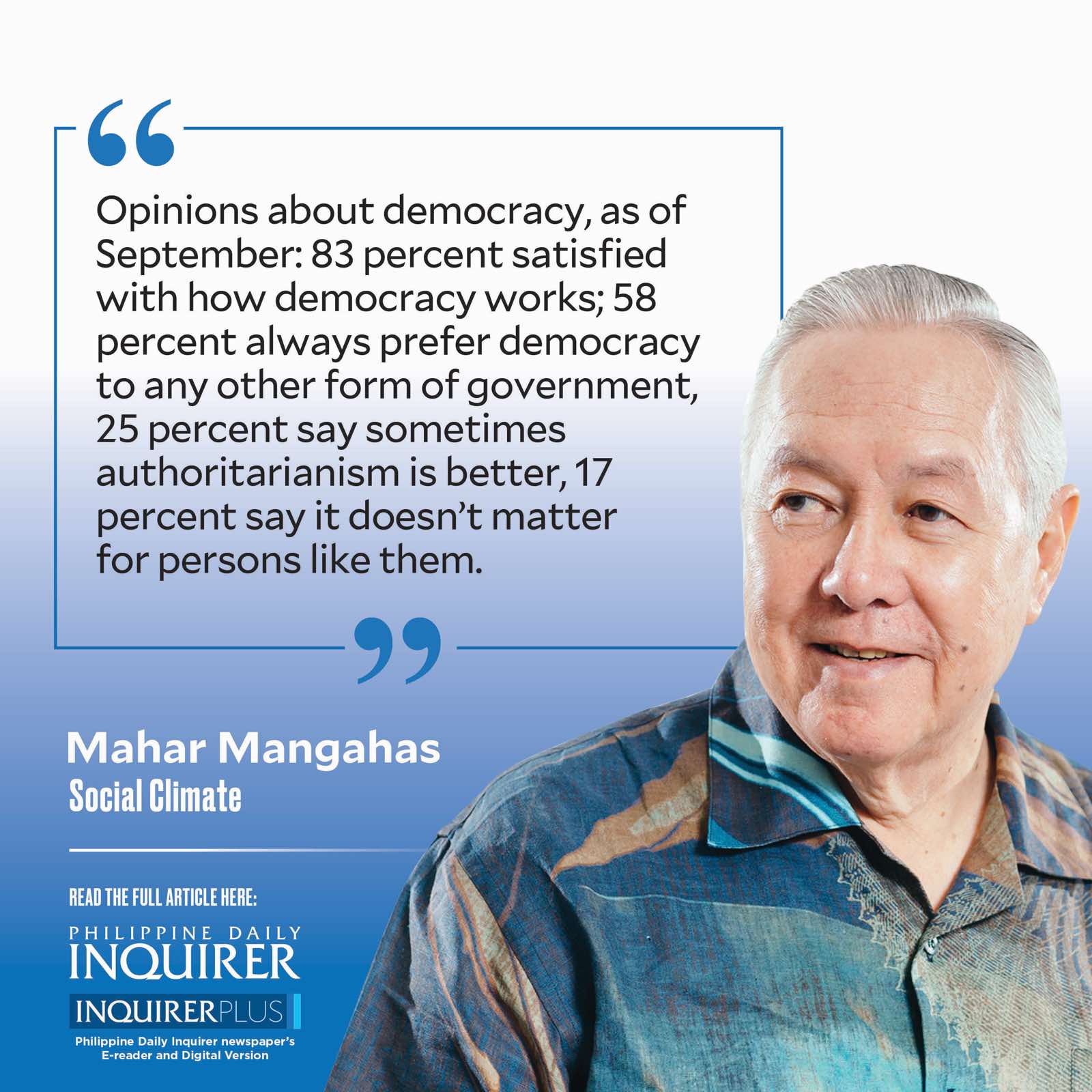
Since 2001, it has been a tradition for Social Weather Stations (SWS), in partnership with the Asian Institute of Management, to review its surveys of the past year. This year the tradition was fulfilled by SWS vice-president/chief operating officer Gerardo “Jay” Sandoval (“The 2024 SWS Survey Review,” www.sws.org.ph, 2/8/24).
The annual review includes many topics not posted on the website. I strongly recommend it to serious analysts of general Filipino well-being and opinions. SWS does surveys on many more subjects than I can deal with in my column; I only select some to write about, taking care not to scoop the SWS media releases. In fact, the annual review uses only four—the non-sponsored ones—of SWS’ 16 surveys last year.
Recently, I discussed the newest SWS findings on poverty and hunger. Let me call attention to the following now:
Approval of the investigation of the International Criminal Court (ICC) of drug-related killings during the Duterte period: at 53 percent in December, up from 45 in March; disapproval at 21 percent, down from 24.
Approval of the government’s permitting the ICC to investigate drug-related killings during the Duterte period: at 57 percent in December, up from 48 in March; disapproval at 19 percent, down from 20.
Opinion of the right time to amend the Constitution, as of March: 40 percent can’t decide; 33 percent now; 27 percent not now.
Knowledge of the Constitution, as of March: 8 percent extensive, 30 percent partial but sufficient, 45 percent a little, 17 percent nothing.
Opinions about democracy, as of September: 83 percent satisfied with how democracy works; 58 percent always prefer democracy to any other form of government, 25 percent say sometimes authoritarianism is better, 17 percent say it doesn’t matter for persons like them. Knowledge of the Maharlika Investment Fund, as of September: 8 percent extensive, 13 percent partial but sufficient, 33 percent a little, 45 percent nothing.
Expected benefit to the Philippines from the Maharlika Investment Fund, as of September: 10 percent very much, 31 percent much, 37 percent a little, 22 percent none.
Confidence that the Maharlika Investment Fund will not end up in corruption, as of September: 7 percent very much, 21 percent much, 42 percent undecided, 17 percent a little, 13 percent very little.
Opinions on the Edsa People Power Revolution, as of March: (a) 62 percent say its spirit is alive; (b) 57 percent say commemorating it is important; (c) as to how many of its promises have been fulfilled, 5 percent say nearly all, 19 percent say most, 47 percent say a few, and 29 percent say almost none.
Worried about catching COVID-19, as of December: 54 percent worried a great deal about catching it, versus 74 percent in April 2022; 17 percent not worried, versus 8 percent in April 2022; Vaccinated against COVID-19, as of December: (a) 7 percent 1 dose, 58 percent 2 doses, 17 percent 3 doses, 6 percent 4 doses; (b) received bivalent vaccine, 2 percent.
Uses a face mask outside the home, as of September 2023, versus December 2022: always/most of the time 28 percent versus 76 percent; sometimes 27 percent versus 15 percent; rarely/never 44 percent versus 9 percent.
Positive net satisfaction scores on the national administration’s performance, as of December: improving children’s education +67, helping disaster victims +61, helping the poor +52, preparing for climate change +37, ensuring food security +29, campaigning against illegal drugs +18, ensuring that no family will be hungry +3.Negative net satisfaction scores on the national administration’s performance, as of December: fighting inflation -29, ensuring oil companies will not take advantage of oil prices -16, fighting corruption -9.Net agreement on whether an ordinary person like the respondent can do something to reduce risks from climate change: +65 percent in December, down from +85 in December 2022.Food stamp program, as of December: (a) 28 percent aware versus 25 percent aware in July; (b) it will benefit families in need, 68 percent versus 62 percent in July; it will only go to corruption 22 percent, versus 30 percent in July.
Problems of public safety in the neighborhood, as of December: (a) fear that the home may be broken into, 50 percent; (b) fear of walking the streets at night, 37 percent; (c) presence of many drug addicts around, 36 percent.
Public satisfaction with the K to 12 basic education program, as of December: 39 percent satisfied, 9 percent undecided, 50 percent dissatisfied, 2 percent no opinion.
Preferred school calendar for classes, as of July: June to March 89 percent, September to June 10 percent, no preference 1 percent.
Net trust ratings of foreign countries, as of December: United States +67, Russia -9, China -41.I skipped some items of the annual review, of course.
—————-
Contact: mahar.mangahas@sws.org.ph.